Some of her films are: Burning Sensation (the demon), Iceman Cometh (the Princess), Stage Door Johnny (the object of desire), Though Shalt Not Swear (Chun, the friend with cancer).

Born in 1952, Died in 1997
As you explore HK film, there seems to one name that is always spoken about with awe, total respect and absolute fondness - and that person is Lam Ching-ying. His early death at the age of 45 was a sad departure of one of Hong Kong's more charismatic and exciting action stars.
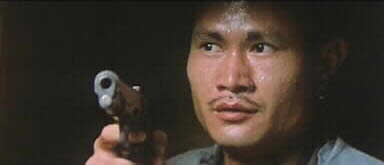

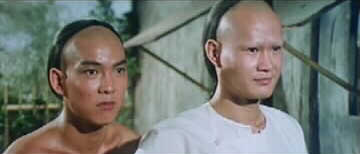

During this time he continued to be a ubiquitous
and important presence in Sammo’s films – Millionaire’s
Express, Eastern Condor, Pedicab Driver, Slickers
vs. Killers. In 1989 he had one of his better dramatic parts in Painted
Faces as a near desperate Peking Opera performer turned stuntman going
through a nervous breakdown. He remained faithful to Sammo until the big
man decided to take some time-off in the early 90’s.
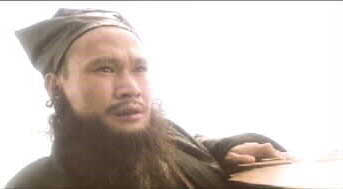
At one time married and the father of two, he was divorced by the time of his passing. Lam had started a romantic relationship though with one of his TV co-stars, the outlandish lady clown Yuen King Tan. He will be sorely missed.
(Thanks to Yves Gendron for most of the above)
This character actor moved to HK from the Mainland in the 70’s and later joined the HK Drama Conservatory. He has been in many films – more often than not cast as a rotten louse. Some films of his – Dream Lovers (friend of Brigitte’s father), Profiles of Pleasure, Lethal Panther, Cash on Delivery (a sleazy lawyer), Angel, Bullet in the Head (the villain Leong), Bullet for Hire (the fellow who kills himself), The Killer (a victim), License to Steal (police supervisor) and A Fishy Story.

This lovely Taiwanese actress made an impression on me in her debut film – Temptation of Office Girls. Physically, she has been compared to Wu Chien-lien.

Born in 1913
One thing that has been rewarding for me in doing these profiles is often discovering unexpected backgrounds for some of the actors. This is certainly the case for this actor. I had come across him in a few films – as Moon Lee’s grandfather in Nocturnal Demon and the grandfather in When Fortune Smiles – but other than enjoying his performances I never really gave him much thought. In Nocturnal Demon his portrayal as a blind man is absolutely hilarious.
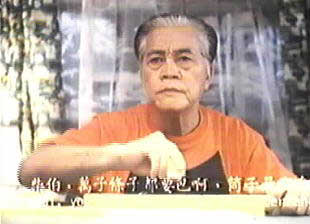
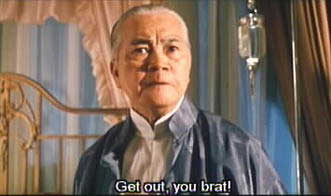
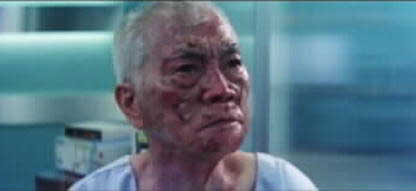
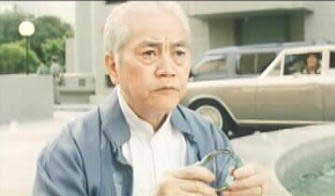
Though I have so far only seen this actress in two films, I was very impressed with her in both of them – the dry cleaner that Francis Ng falls for in Bullets Over Summer and Anthony Wong’s girlfriend in Ungrateful Tink.

Lam Suet has become nearly everyone’s favorite supporting actor over the past couple of years. Though likely never the stuff of a leading man with his blotchy skin, rotund physique, tiny eyes and moles, he is a brilliant character actor and a real pleasure to watch. He is almost chameleon like – taking on entirely different types of characters – and managing to often look very different in films.


On the Mobius Board, Sebastian Tse had some good information to add regarding Lam:
In 1979, Lam Suet went to HK from Tianjian City in North China to inherit his grandpa's belongings. After spending his last dollar within a few months' time, Lam had to work in local factories for survival. He changed jobs often and stuck finally as a part-time carpenter.
The one responsible for introducing Lam into the movie circle was the legendary Lam Ching Ying. The two of them became great friends while playing English snooker. It was Lam Ching Ying who first brought Lam Suet into the movie industry as script supervisor. He also had numerous other jobs on the set before getting into acting. He can be seen in a number of very small roles before getting his big break under Johnny To.
And Christopher Fu adds the following on why his given name is Suet - "snow":
Lam Suet is named after his father's favourite
novel, SEA OF FOREST, PLAIN OF SNOW. The title is a Chinese war novel
written during the 1950s, set in his father's homeland in Manchuria about
the adventures of the 203rd battalion against 'bandits'.
This actor has been in films since the 1970s – some of his better known titles are - She Shoots Straight (the superintendent), Criminal Hunter, Burning Ambition.
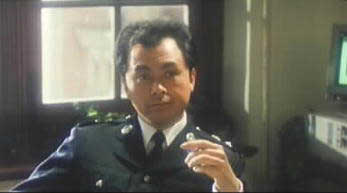
Born 02/16/64 in Guangdong
In some mysterious manner and at some undeterminable point in the 90’s Lau Ching-wan became HK’s finest male actor and one of its most popular leading men. He had been striving away in TV and films since the early 80s but had never really made much of an impression and was considered by many to be too unattractive (a slightly pudgy face and a skin tone considered too dark - the latter of which gets referred to in some of his movies, e.g., It’s a Wonderful Life) to ever become a leading man. But somewhere along the way, Lau continued learning his craft – but more importantly he magically gained charisma – buckets of it – and the face once considered ungainly instead now had character. Some actors have “it” right from the beginning, others grow into it – a maturing process that needs to take place – and this is clearly what happened with Lau.

The films he was in from the mid 80’s to the early 90’s are mainly forgettable – Sunrise, My Dear Son, Live Hard, The Roar of the Vietnamese, Angel Hunter, The Shootout – but in 1993 he finally started coming into his own – surprisingly to many people as a romantic lead. In the Derek Yee film C’est La Vie Mon Cherie he teamed up with Anita Yuen to make a hugely popular tear jerker (for which he received a HKFA nomination) and this led to him being teamed up with Anita in many films. They have wonderful chemistry together on screen and are a pleasure to watch – Anita’s bubbly quirkiness is a perfect contrast to his more down to earth personality. Besides C’est La Vie Mon Cherie, they appeared together in It’s a Wonderful Life (though not as romantic interests for each other), I’ve Got You Babe, Tears and Triumph, Tricky Business, Golden Girls and Tri-Star.


He is married to actress Amy Kwok who co-starred
as his wife in The Victim.
During the Wuxia/kung fu period of the late 60's to the early 80's, there are really two directors with mass appeal that clearly dominated the period - Chang Cheh and Lau Kar Leung. To a large degree these two men created, sustained and drove this film genre over these years. Chang Cheh began it in the late 60s with his Jimmy Wang Yu swordplay films and he then later directed Ti Lung, David Chiang, Alexander Fu Sheng and the five Deadly Venoms in many of the kung fu classics of the 70s. From the mid 70s on though, it was Lau -- with a series of brilliant and innovative films -- who dominated the kung fu genre. Also, if you dig a little deeper, you discover that it was actually Lau who did much of the action choreography for Chang. One could thus theorize that perhaps Lau was the most influential innovator and filmmaker in HK over all these years.
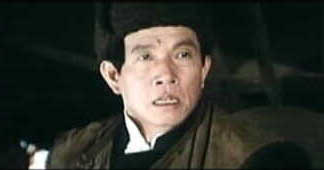
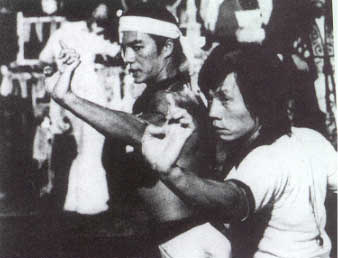
By 1974, nearly a decade worth of wuxia/kung-fu feverish effort had finally caught up with Chang Cheh and he appeared to have reached a state of creative burn-out. It was Lau who then suggested to Chang that he make films centered around the Shaolin mythos and it's legendary heroes. Lau also felt that rendering the fight choreography in true authentic fashion would revitalize the genre. Heroes Two, Men From the Monastery, Shaolin Martial Art, Five Shaolin Masters and Disciples of Shaolin were the films that resulted from this new thinking. They also revealed the incredible talent of Fu Sheng, the first "comedian" of modern kung fu movies, and recast kung fu movie making away from the Wang Yu/Bruce Lee lone avengers mold. This Shaolin kung fu sub-genre gave some much needed focus to a filmic genre that had been in disarray after the death of Bruce Lee.
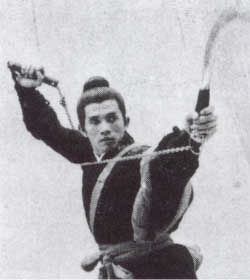
As a martial art master and a direct linear descendant of Wong Fei-hung, Lau knew better than anyone that martial-arts was life affirming and not a tool of death and destruction like the way it had been depicted for a decade in the movies. He wanted to do movies with an agenda to promote "true" Chinese martial art and to reveal and teach about it's many not so obvious facets. Such a didactic approach is most apparent in his Heroes of the East (better know in the West as Shaolin vs Ninja) a martial arts and culture clash between the Chinese and Japanese fighting arts, but almost all his films have in one way or another such dimensions to them.
Some of his classic films - often starring his adopted brother Lau Kar Fai (Gordon Lui) – were Challenge of the Masters, 36th Chamber of Shaolin, Executioners from Shaolin, Shaolin vs Ninja, Dirty Ho, My Young Auntie, The Lady is the Boss, Legendary Weapons of China and Martial Club.
For a couple of years, Lau was incredibly successful, his films were the top grossing kung fu productions of the year, and he got recognized as the one authentic author of the genre by film critics and scholar alike. However, when the kung fu action/comedy of Sammo Hung, Yuen Woo Ping and Jackie Chan exploded onto the scene, Lau lost much of his popular momentum and his films began to seem out of date. His films might have been the richest and most exquisite kung fu productions ever made but they were now getting outshone by the fresh, impertinent, naughty and acrobatic action delivered by a new generation of younger players who -- ironically enough -- could trace many of their ideas directly to Lau’s own original one(s).
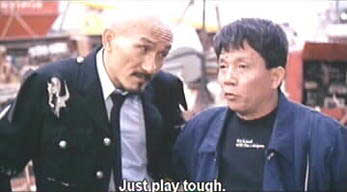
Lau did direct a few more films after this - Jet Li in Martial Arts of Shaolin, Tiger on the Beat I & II, Aces Go Places V, but all except the first Tiger on the Beat ended up being box-office disappointments. Lau also tried to come-up with a project of his own that included a Wong Fei-hung movie with him in the lead as well as a One Armed Swordsman remake that would have starred up and coming action performer Donnie Yen. But in the mind of many his time had clearly passed and the industry was only ready to offer him supporting character roles, usually martial arts masters of course. In one such part however, he definitively proved that he had still the "right stuff" at least physically. The impromptu duel between him and star/director Sammo Hung showcased in Pedicab Driver was a memorable clash that ended-up with five foot tall, fifty something Lau trashing big man Sammo in a pole duel described as the greatest of it's kind ever captured on film
In 1994, he began directing Drunken Master II starring Jackie Chan but there were major disagreements between them about the style of the choreography. Jackie felt that Lau was being too old school - and Lau either left the project or was fired (though he is still credited as director) though he did go on to direct a rival Drunken Master III, but that was considered a major failure. Drunken Master II is of course considered a classic – and there is always much discussion about who is more responsible for this – Jackie or Lau. . One clearly senses that the story came more from Lau – the importance of, and method of depicting, the relationships between father and son, mother and son, husband and wife are very much in the tradition of Lau’s earlier work. The fact too of a woman – Anita Mui – having such a large, spirited part is likely Lau’s doing – as Jackie is fairly well known for not giving women large roles in his films other than as the helpless damsel in distress. Compare the Anita here to that who also was in Jackie’s Rumble in the Bronx.
Despite the major drawbacks his career suffered since the early eighties, his imprint on Hong Kong film is enormous. He was the very first action choreographer to ever rise to the director position paving the way for the new generation of kung fu film makers such as Sammo,Yuen Woo Ping and Jackie Chan. His films, his ideas and his legacy have inspired and influenced every action director that has followed him. In a sense he salvaged the kung fu genre from the “chop socky” mediocre quagmire of the mid seventies giving it a new lease on live and making it into a valid, dynamic genre. This legacy is unfortunately not fully recognized by the Western viewing public.
Lau appeared in a number of films as well - his kung fu was wonderful - as the part he plays in Drunken Master II (at the age of 57 no less!) shows. Some other films that he can be seen in are Legendary Weapons of China, The Lady is the Boss, 8 Diagram Pole Fighter, Evil Cat, The Thirty Million Dollar Rush, Pedicab Driver, New Kids in Town and Drunken Master III.
Recently, Lau was afflicted by a bout of cancer that he seems to have totally recovered from. He married late in life he now enjoys a happy retirement with his young wife and two small daughters. He still receives occasional acting or directing offers but is probably soured by his bad experience on Drunken Master II and III and he express no interest unless he has complete control of the project.
(Aided and abetted in a major way from Yves
Gendron)
Lau Kar Wing is the brother of Lau Kar Leung and though his work is certainly over shadowed by his brother's accomplishments he has had a very respectable career in acting, choreography and directing. Like his brother he began as a stuntman and had some small action roles. He too appeared in a number of the Wong Fei-hung films - and like his brother was employed by the Shaw Brothers to do some action choreography for Chang Cheh and others up until the mid-seventies. His most notable work of all is the action seen in King Boxer (aka: Five Fingers of Death) the very first kung fu picture ever distributed to the western world at large.
Although he remained a regular player in his brother’s films after that, he quit Shaw Brothers and went out on his own. In 1976 he had his first leading part in Karl Maka's The Good, the Bad and the Loser, the very first real kung fu parody, playing what would become his regular stock character of a crafty wise-guy. The following year he decided to follow in his brother and Maka’s footsteps and directed a kung fu spoof, He Has Nothing But Kung-fu.
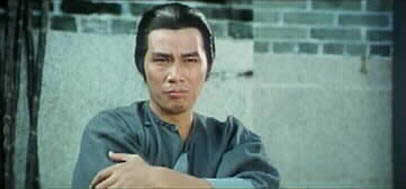
Short and unremarkable looking, Lau Kar Wing doesn't appear to be the action performer or the martial arts master that he really is. He is however easily as good as his two siblings in the martial arts as he proved in both the aforementioned Knockabout and in the finale of Legendary Weapons of China. In this latter film during a breathless fifteen minutes duel with his elder brother, Leung proficiently handled no less than a dozen different martial arts weapons.
All these movies made Lau a significant force in the then emerging kung fu comedy genre, but after the Gar Bor dissolution in 1979 his career seemed to stagnate while both Maka and Sammo rose to a dominant position in the film industry. He continued to work in his brother’s movies and then rekindled his association with Sammo Hung following the Shaw Brothers closure. He worked as a bit player and assistant action choreographer from My Lucky Star up until Millionaires Express for Sammo.
Meanwhile he continued his activities as an action choreographer and also regularly did some film directing. His directorial efforts in the eighties include Till Death Do We Scare (1982), Those Merry Souls, and Scared Stiff. His best work was the wily caper Treasure Hunters that saw kung fu comedian Fu Sheng finally in a fully-fledged kung fu comedy. Then in 1990 there was a reunion of sorts with Lau, Sammo and Maka collaborating on Skinny Dragon and Fatty Dragon.
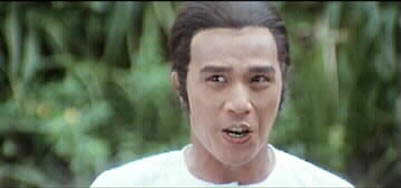
(Written up by Yves Gendron)
Lau has appeared in films over the decades of the 70s’, 80s and early 90s. He was one of Roy Chiao’s men in the King Hu film The Valiant Ones in 1975, Cherie Chung’s village boyfriend in Wild Search, a cop in a myriad of films from In the Line of Duty 5 to City on Fire. A few other films in which he can be seen are Moment of Romance, It’s a Drink, It’s a Bomb, Royal Tramp I and Prince of Temple Street.
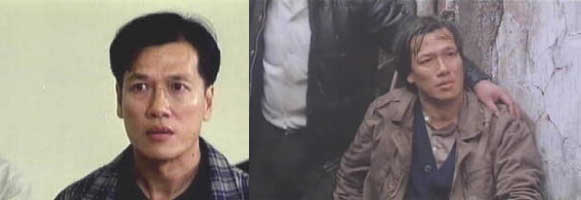
Lau Shun always fascinates me on the screen with his wonderfully dramatic facial expressions. It took me a while to realize who he was as he often looks very different from film to film and connect up his many various roles. He was a well known Peking Opera star in the Mainland and didn’t come to HK until the mid-80s – just in time to appear in a number of Tsui Hark’s fantasy classics. He was the eunuch in Chinese Ghost Story II, the eunuch in Swordsman (1), Zen in Swordsman II, the good sifu in Tai Chi Master, Asia in The East is Red (in disguise at the beginning) and Cha in Dragon Inn.


(Information provided by James Chang)
|
|
|
|